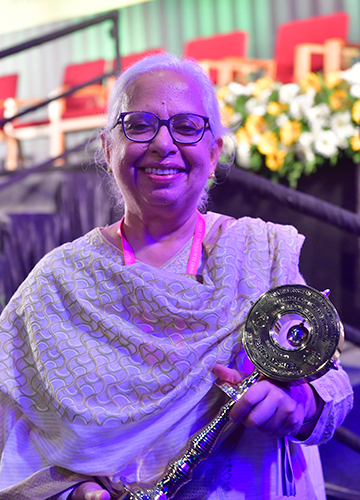When Reena Mohan joined the Film and Television Institute of India in Pune, there were just five women on the campus. “Oh, you took a boy’s seat; you will get married and leave editing,” she often heard the comment. Mohan never left editing and never stopped learning cinema.
The Bombay film industry did not attract her, but documentary filmmaking did. As part of her final-year project, she made a documentary on a Warli painter. That work viewed the subject “from a distance”, and was quite unlike her later works.
After graduating from FTII in 1982, Mohan joined the Centre for Development of Instructional Technology in Delhi. Those days allowed her to work with communities at the grassroots, especially women. Then came an offer from filmmaker Mani Kaul to edit his Maati Manas (1984). While working on it, she earned a better understanding of the “rhythm and energy” within a shot, and where to cut and where not to. The learning experience continued while working with Renu Saluja—a pioneer among women film editors—on Vinod Chopra’s Khamosh (1986).
In a career spanning four decades, Mohan directed 10 documentaries and edited more than 50. She edited a few feature films and television series as well. Mohan won the Lifetime Achievement Award at the 14th edition of the International Documentary and Short Film Festival of Kerala in Thiruvananthapuram on August 26.
It was while researching for an article on silent cinema that Mohan met Kamlabai Gokhale, one of the earliest woman actors in India. “We spent the day with her at Pune; we played cards, she was cheating and was very funny,” remembers Mohan. “While coming back, one of my friends said that I should make a documentary film on her. I was hesitant. Then she said: ‘She is so charming; she is unlike an old person. You cannot capture that in text, it has to be a film.” And, that is how Mohan decided to don the cap of a director, and Kamlabai—who was part of Dadasaheb Phalke’s second film, Mohini Bhasmasur (1913)—inspired her.
After the first two schedules of the shoot, Mohan made a rough cut of the film and showed it to some friends. “But they said it was dull and boring,” she says. “ I realised that Kamlabai was cracking all those jokes when the camera was off. So, I went back to shoot with her again. And this time, the camera was kept running when she was cracking jokes or teasing us.” The documentary was awarded the National Film Award for the Best First Film of a Director in 1992.
While working on critically acclaimed documentaries like Skin Deep (1998)—which explored body image and self-identity—and On An Express Highway (2003)—which was on the life of a businesswoman who would become a Jain monk—Mohan had to think out of the box as in both the documentaries she faced a situation where her subjects refused to be on camera. But the challenge allowed her to experiment with the form.
Documentary is one form where people expect to see the ‘truth’. However, Mohan left that obsession with ‘literal truth’ a long time ago. She knows that what she films is just an interpretation, a perspective, of her subjects, and she is just being true to that.


